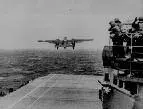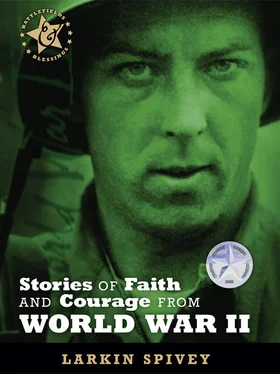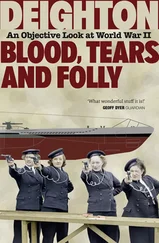Who of you by worrying can add a single hour to his life?
—Matthew 6:27
February 8
Tapping on the Hull
Richard Fiske was a Marine on the USS West Virginia . On December 8, the day after the ship was sunk at her Pearl Harbor berth, he and other crew members heard a desperate, insistent tapping sound from inside the hull. An urgent search began of the accessible compartments, but, despite their best efforts, they were unsuccessful in finding the trapped crewmen. Fiske described with difficulty the events that followed:
That tapping went on all week long. They sent divers down 14 times to find those guys. They did the best they could, but they just couldn’t find them. We didn’t know who was down there, but the tapping continued until December 24 th. When we went into dry-dock on June 18, 1942, we found them. They were in the last watertight compartment we opened. We found a calendar and a clock with them. I often wonder what they were thinking about. Their lives were cut so short and they never had a chance to realize their dreams. 55
This incident deeply affected Fiske for the rest of his life. He could never forget what happened and could only state that, “I pray every day because the good Lord was with us.” 56Today, we also hope and pray with this survivor that the Lord was with all the crew on the West Virginia that day, including those men trapped below. We pray that they were sustained by the strength that can come only from God to calmly face such a hopeless situation. We need to remind ourselves today that God is the source of our own strength. He promises to be beside us, no matter the time, place, or crisis.
“Am I only a God nearby,” declares the Lord, “and not a God far away? Can anyone hide in secret places so that I cannot see him?” declares the Lord. “Do I not fill heaven and earth?” declares the Lord.
—Jeremiah 23:23–24
February 9
Saved from Drowning
The USS Arizona and other battleships moored along “Battleship Row” were the primary targets of the first Japanese attack. Within ten minutes a bomb crashed through the Arizona’s armored decks to ignite the magazine. The ship’s sides were ripped out and fire engulfed almost the entire ship. Within minutes the great vessel sank with a loss of thirteen hundred crewmen. Marine Cpl. E. C. Nightingale was preparing to abandon ship:
Charred bodies were everywhere. I made my way to the quay and started to remove my shoes when I suddenly found myself in the water. I think the concussion of a bomb threw me in. I started swimming for the pipe line which was about one hundred and fifty feet away. I was about half way when my strength gave out entirely. My clothes and shocked condition sapped my strength, and I was about to go under when Major Shapley started to swim by, and seeing my distress, grasped my shirt and told me to hang on to his shoulders while he swam in.
We were perhaps twenty-five feet from the pipeline when the major’s strength gave out and I saw he was floundering, so I loosened my grip on him and told him to make it alone. He stopped and grabbed me by the shirt and refused to let go. I would have drowned but for the Major. We finally reached the beach. 57
The major undoubtedly knew that continuing to help Nightingale might result in death for them both. He also knew that letting go of him would mean certain drowning for the corporal. Shapley considered the risk to his own life and counted the attempt worth the effort. How often are we faced with situations in which helping someone else poses a risk to ourselves, either in terms of physical health, monetary loss, social status, or reputation? And how often do we consider that risk worth it for the chance to aid someone else in need? (JG)
Greater love has no one than this, that he lay down his life for his friends.
—John 15:13
February 10
Will Whiskey Do?
For a few minutes, Lee Soucy, a pharmacist’s mate aboard the USS Utah , and his shipmates thought some kind of crazy bombing practice was going on over the harbor. Then “General Quarters” sounded, sending them to their battle stations. Within minutes the ship was shaken by a series of violent jolts and began to list badly. Over the ship’s PA system, Soucy heard a bugle call followed by the boatswain’s shout, “Abandon ship!” He was soon in the water swimming for Ford Island.
Ashore, he helped treat the wounded at an emergency first-aid station set up in a nearby Bachelor Officers’ Quarters building. The wounded flooded in, and it did not take long to exhaust the medical supplies on hand. Someone called for more alcohol and heard the reply, “Alcohol? Will Whiskey do?” In a few minutes a case of scotch and other assorted bottles of liquor appeared. These served the purpose of washing off the sticky oil and providing antiseptic for the wounds. There were other uses as well:
At one point, an exhausted swimmer, covered with a gooey film of black oil, saw me walking around with a washcloth in one hand and a bottle of booze in the other. He hollered, “Hey Doc, could I have a shot of that medicine?” He took a hefty swig… then he spewed it out along with black mucoidal globs of oil. He lay back a minute after he stopped vomiting, then said, “Doc, I lost that medicine. How about another dose?” 58
One of the hallmarks of American military men and women has always been the ability to see humor in tense situations. This probably reflects a degree of optimism in the American culture not seen in many others. We also have biblical encouragement for a light heart in the secure hope of a joyful future, reunited eternally with our Savior.
He will yet fill your mouth with laughter and your lips with shouts of joy.
—Job 8:21
February 11
Encouraging a Mother
The end of the Doolittle raid came a little after midnight for Billy Farrow and the other four members of his crew. They had flown their B-25 off the carrier Hornet , bombed Japan, and continued until they were near Nanchang, China. As the fuel ran out and the engines started to cough, they had no option left except to bail out of their aircraft into the inky darkness. They were captured the next day. A few months later Farrow and two others were put on trial for unspecified charges, found guilty, and sentenced to death.

B-25 takes off from the USS Hornet . (National Archives)
A day before his execution, Farrow composed a letter to his mother at home in Darlington, South Carolina. He himself was unshaken and unbowed in his hour of trial, but he knew how devastating his death would be to his mother. He sought to comfort her by reassuring her of his own faith. The final lines of his letter were: “Don’t let this get you down. Just remember God will make everything right and that I’ll see you all again in the hereafter. Read ‘Thanatopsis’ by Bryant if you want to know how I am taking this. My faith in God is complete, so I am unafraid.” 59
Farrow’s letter home was found in the files of the Japanese War Ministry after the war was over. It was given wide circulation in the United States and became the basis for countless sermons and editorials. His concern for his mother and his spiritual strength in the darkest possible circumstance were a witness to the world of the power of his faith. His words brought comfort and encouragement to millions.
Now faith is being sure of what we hope for and certain of what we do not see.
—Hebrews 11:1
Читать дальше













